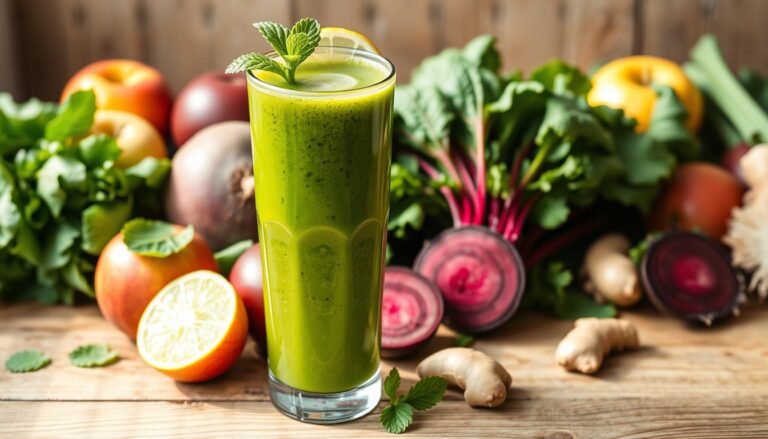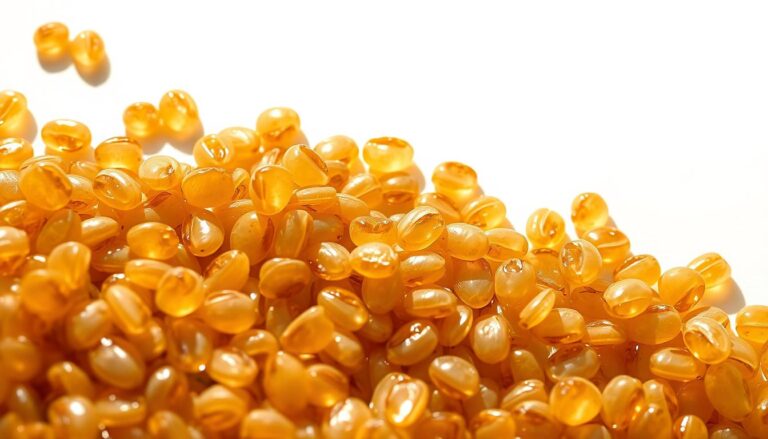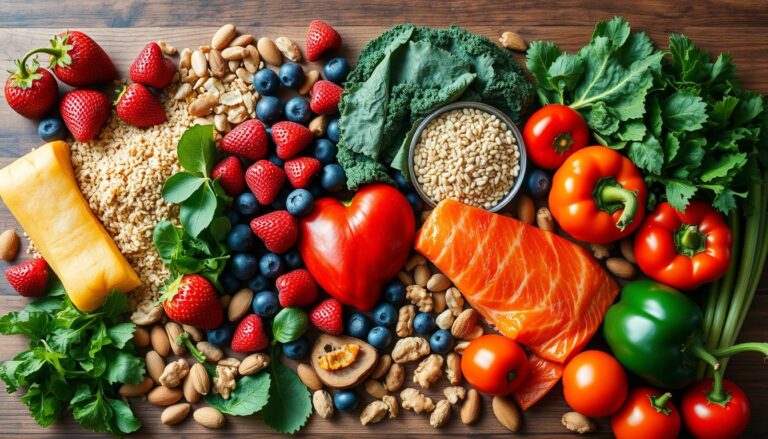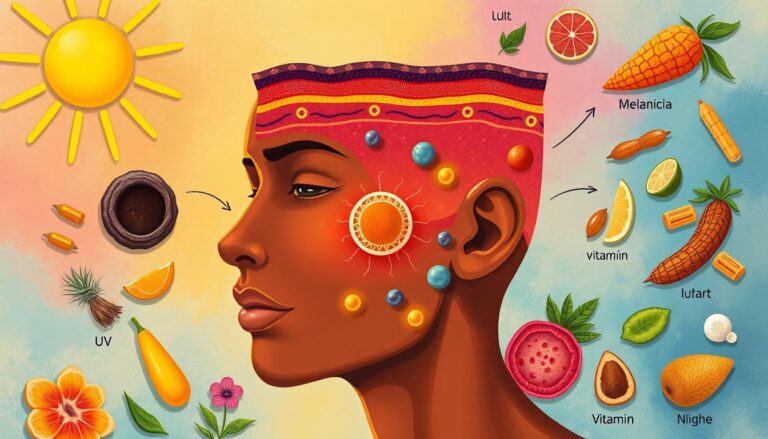When we’re stressed we often reach for easy comfort foods. This can lead to eating too much or too little. But many of these foods and drinks can actually raise our cortisol levels, making stress worse.
Knowing how our diet affects stress hormones is key to staying healthy.
Key Takeaways
- Stress can lead to cravings for high-glycemic foods, which can spike cortisol levels.
- Alcohol consumption and caffeine-rich beverages can stimulate the adrenal glands to produce more cortisol.
- Processed foods, high-fat foods, and sugary snacks are associated with increased cortisol levels.
- Certain nutrients, such as protein, B vitamins, and magnesium, can help manage cortisol and reduce stress.
- Incorporating anti-inflammatory, antioxidant-rich foods into your diet can support healthy cortisol regulation.
Understanding the Food Stress Connection
The link between food and stress is intricate. The body’s production of cortisol is key. When stress hits, the adrenal glands boost cortisol. This change affects our cravings and eating.
The Role of Cortisol in Stress Response
Cortisol is a strong stress hormone. It helps us react to threats. When stressed, cortisol levels go up. This prepares the body for action by releasing energy.
How Stress Affects Food Cravings and Eating Habits
Stress can change our food cravings and eating habits. High cortisol makes us want more calories, especially in sugary and fatty foods. This can lead to eating too much and gaining weight.
Stress also messes with insulin, causing blood sugar swings. This makes cravings worse and starts a cycle of unhealthy eating.

Prolonged sucrose consumption was associated with reduced cortisol responsiveness to stress in humans.
Foods That Contribute to High Cortisol Levels
In today’s fast world, stress is common, with COVID-19 making it worse for many. High cortisol levels can cause anxiety, insomnia, and weaken our immune systems. Some foods can make cortisol levels even higher, adding to our stress.
Sugar and Refined Carbohydrates
Sugar and refined carbs are quickly turned into glucose by our bodies. This is bad when we’re stressed because cortisol makes more glucose and less insulin. Eating a lot of added sugar and fat can raise cortisol more than eating fruits, veggies, and whole grains.
Alcohol
Alcohol also raises cortisol levels. It makes our adrenal glands produce more cortisol, making us feel stressed. Drinking too much can also cause a bad hangover.
Caffeine Rich Beverages
Caffeine in coffee, tea, and energy drinks can also increase cortisol. Caffeine can raise cortisol, affecting our mood and leading to crashes. It’s key to watch how much caffeine we drink, especially when stressed.
Knowing how certain foods affect cortisol levels helps us make better food choices. This can help us manage stress and improve our overall health.

Foods That Help Manage Cortisol Levels
Keeping cortisol levels healthy is important for our well-being. High cortisol can lead to weight gain, sleep issues, weakened immunity, and chronic diseases. Luckily, some foods are packed with nutrients that help manage cortisol and support our body’s stress response.
Protein-Rich Foods
Protein rich foods with tryptophan help control cortisol levels. Tryptophan turns into serotonin, which helps us sleep well and feel good. Eating carbs with protein foods helps our body use tryptophan better.
B Vitamins
B vitamins are key for energy and managing cortisol. They help our brain work right and make serotonin, which fights stress. So, they’re vital for handling stress well.
Magnesium-Rich Foods
Foods like almonds, dark greens, brown rice, tofu, and bananas are full of magnesium. Magnesium helps our body handle stress hormones and break down cortisol. It’s also important for energy.

Eating these nutrient-rich foods can help manage cortisol levels. This supports our health and well-being. A balanced diet and lifestyle are crucial for effective cortisol management.
The Impact of Omega-3 Fatty Acids on Cortisol
Research shows that omega-3 fatty acids can help control cortisol levels and stress. These healthy fats are found in fish like salmon, tuna, and sardines. They help fight inflammation and support brain health, aiding in a better stress response.
A study with 138 middle-aged, overweight people found omega-3s helped protect against stress. The group taking 2.5 g/d omega-3 had lower cortisol and IL-6 levels than the placebo group.
More research shows omega-3s reduce inflammation during stress. They also lower heart rate and blood pressure in response to stress.
Omega-3s do more than just manage cortisol. Studies link high omega-3 intake to lower heart disease risk. They may even help people live longer at a cellular level.
It’s key to find the right amount of omega-3s for stress management. Talking to a healthcare professional can help determine the best dosage for your needs.
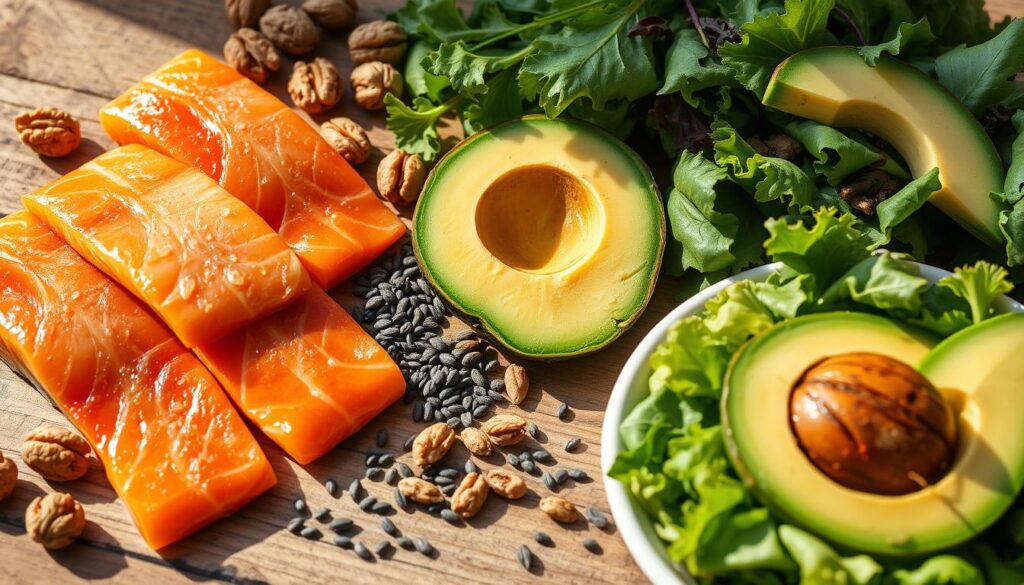
In summary, adding omega-3 fatty acids to your diet can help manage stress and keep cortisol levels healthy.
Antioxidant-Rich Foods for Stress Relief
Eating foods high in antioxidants like vitamins A, C, and E can protect your brain. This helps reduce anxiety. Carrots, sweet potatoes, broccoli, leafy greens, strawberries, and citrus fruits are great sources.
Vitamin C for Cortisol Management
Vitamin C is key during stress. Studies show taking about 1,000 mg daily can lower blood pressure. It also helps cortisol levels recover faster.
Acerola cherries have more vitamin C than citrus fruits. They’re a good way to get more of this stress-fighting nutrient.
Fruits and Vegetables for Mood and Stress Support
Whole, nutrient-dense carbs like sweet potatoes and whole grains can boost mood. They increase serotonin levels temporarily. Cruciferous veggies like broccoli are also good, with magnesium, vitamin C, and folate.
Adding a variety of fruits and vegetables to your diet is simple. It supports your body’s stress response and keeps you well.
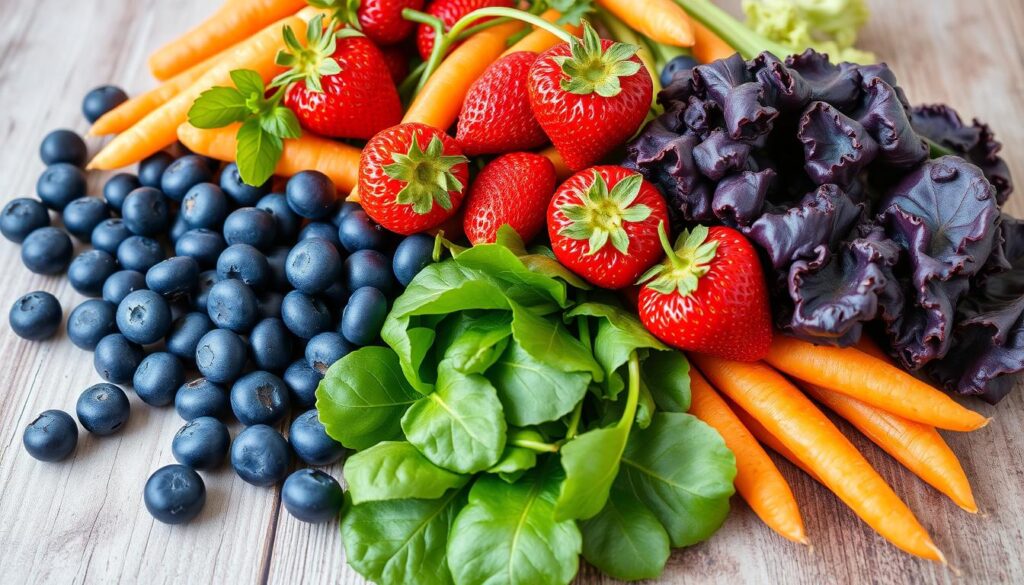
Eat the rainbow to get a wide range of beneficial plant compounds that can help manage cortisol and reduce stress.
What foods increase cortisol levels?
Keeping cortisol levels balanced is key for health and happiness. Some foods can make cortisol go up, making stress worse. Knowing which foods to avoid can help manage stress better.
Processed Foods
Pre-packaged snacks, frozen meals, and fast food are bad for cortisol. They have unhealthy fats, refined carbs, and sugars. Eating these can raise blood sugar and insulin, increasing cortisol. This can harm the body’s stress response and lead to health problems.
High Fat Foods
Foods with lots of saturated and trans fats, like red meat and fried foods, raise cortisol. These fats cause inflammation, which is linked to stress and cortisol. Eating less of these foods helps keep cortisol levels healthy.
Sugary Snacks
Sugary foods like soda and candy quickly raise blood sugar, increasing cortisol. This cycle can make you feel stressed and anxious. Choosing low-sugar foods is better for managing cortisol.
| Food Category | Effect on Cortisol Levels |
|---|---|
| Processed Foods | Increase |
| High-Fat Foods | Increase |
| Sugary Snacks | Increase |
Being careful about these foods and choosing healthier options can help manage stress. A balanced diet is important for keeping cortisol levels in check.
Supporting Gut Health for Stress Management
The gut and brain are closely linked for mental health. Serotonin, which affects mood, is mainly made in the gut. Eating foods that support gut health can help lower stress and anxiety.
Prebiotic foods like whole grains, beans, and onions feed good gut bacteria. Probiotic foods like kefir, kombucha, and yogurt add these beneficial microbes. A healthy gut microbiome is key for mental health and stress management.
Prebiotic and Probiotic Foods
Eating more prebiotic and probiotic foods can help your gut health and reduce stress:
- Whole grains brown rice, quinoa, oats
- Legumes beans, lentils, chickpeas
- Bananas, onions, garlic, and other high-fiber fruits and vegetables
- Fermented foods kefir, kombucha, sauerkraut, miso, tempeh
- Yogurt and other dairy products with live, active cultures
By feeding your gut with prebiotic and probiotic foods, you can manage stress better. This supports your mental well-being.
Lifestyle Factors That Influence Cortisol Levels
Many lifestyle choices can affect cortisol levels, a hormone that helps us deal with stress. Getting enough sleep, drinking plenty of water, and exercising regularly are key. These habits help manage cortisol and improve our overall health.
Sleep Quality
Good sleep is vital for keeping cortisol levels in check. Research shows that less sleep means higher cortisol levels. So, aim for 7-9 hours of quality sleep each night to keep cortisol balanced.
Hydration
Drinking enough water is also crucial for cortisol balance. Not drinking enough can make cortisol levels go up, leading to tiredness and stress. Try to drink at least 2 liters of water daily to help your body stay hydrated and cortisol levels stable.
Exercise
Exercise, like yoga or swimming, can lower stress and cortisol levels. Doing a mix of cardio and strength training helps manage cortisol and boosts well-being.
By focusing on sleep, hydration, and exercise, you can help keep cortisol levels healthy. This reduces the harm of chronic stress on your body and mind.
Addressing Cortisol Imbalances
Cortisol is a key hormone for our body’s stress response. But, an imbalance can cause health problems. Knowing the signs of cortisol deficiency and getting professional help are key to fixing these issues.
Signs of Cortisol Deficiency
People with cortisol deficiency might feel very tired, dizzy, or weak. They might also notice changes in their skin color, lose weight, or feel depressed or anxious. In severe cases, like Addison’s disease, symptoms can come on quickly and include pain, low blood pressure, and changes in consciousness.
Consulting a Healthcare Professional
If you think you have a cortisol imbalance, see a doctor. An endocrinologist or primary care physician can help. They’ll do blood tests to find out why and create a treatment plan. Getting the right diagnosis and treatment is vital for your health.
| Symptom | Description |
|---|---|
| Fatigue | Persistent feelings of exhaustion and lack of energy |
| Dizziness | Lightheadedness or vertigo, especially when standing up |
| Muscle Weakness | Loss of strength and difficulty performing daily activities |
| Skin Color Changes | Darkening or discoloration of the skin, especially in areas exposed to the sun |
| Weight Loss | Unexplained weight loss or difficulty gaining weight |
| Psychological Effects | Depression, anxiety, and mood changes |
By recognizing the signs of cortisol deficiency and seeking professional guidance, individuals can take proactive steps to address cortisol imbalances and improve their overall health and well-being.
Addressing cortisol imbalances is crucial for maintaining overall health and well-being. Consulting a healthcare professional is the first step towards understanding and managing these hormonal fluctuations.
Conclusion
The foods we eat greatly affect our stress levels and how much cortisol we produce. Avoiding foods high in sugar, refined carbs, alcohol, and caffeine is key. Instead, choose foods rich in protein, B vitamins, magnesium, omega-3s, and antioxidants.
Also, taking care of your gut, getting enough sleep, staying hydrated, and exercising regularly are vital. These habits help keep cortisol levels in check.
Understanding the link between food and stress is crucial. Making smart food choices and managing cortisol can greatly improve health. By changing what we eat and how we live, we can better handle stress and live healthier lives.
This summary highlights the critical role of diet in managing stress and improving health. By using this knowledge, we can make better food choices and adopt healthier habits. This empowers us to manage stress better and improve our overall well-being.
